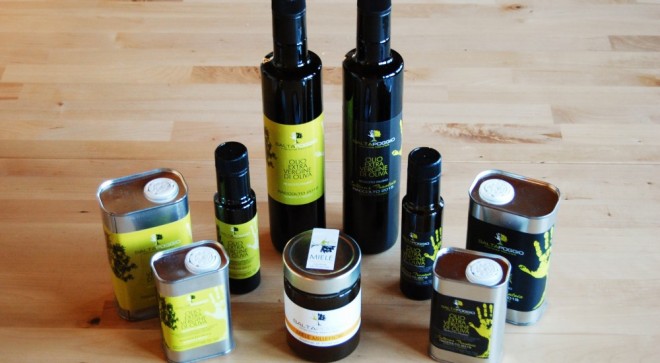How do you choose fresh extra virgin olive oil?

Did you know that in Italy more than 90% of basic products such as pasta, coffee, wine etc.. are purchased in mass-market stores? That means that out of 10 packets of coffee sold in Italy, 9 are sold in supermarkets and only 1 in a local shop.
This said, let’s move on to ask: Where are you exactly, when you decide to purchase a bottle of extra virgin olive oil?
Ok. You’re in a supermarket. There’s NO WAY YOU CAN SMELL OR TASTE THE OIL you’re thinking of buying and in front of you is whole shelf full of possibilities. The upper shelves are taken up by major BRANDS that invest in advertising. Their products are the most expensive. A lot of money and time has been invested just to convince you that their products are the best. Towards the middle, instead, you’ll find brands that are not currently being advertised, but that are still echoing in your brain. The supermarket’s brand is also positioned at this height but you know, of course, that the supermarket doesn’t happen to own any olive groves, so their oil must come from consortiums or great olive oil bottlers that buy olives in bulk. Here we’re talking about an AVERAGE PRICED olive oil. Lower down, almost at floor level are items that are usually selected because of their RIDICULOUSLY LOW PRICE. In most cases the brands are fake, it’s a two-for-one-sale or some other gimmick.
Now just think about this:
Someone, certainly not alone, must have spread a net under the olive tree, then climbed the tree and picked the olives one by one or handcombed them or used a pneumatic harvester, then gone on to select the olives, place them in crates, onto a truck and within 48 hours to the oil mill, where the olives underwent washing, cleaning and crushing with machinery that can easily cost thousands of euros and in the final stage, the oil was bottled, labled and shipped.
HOW CAN THIS KIND OF PRODUCT COST THE SAME PRICE AS WATER?
Now you can come to two conclusions:
Either the people employed in this production chain are considered slaves and do not get paid at all OR the oil we are talking about, comes from far away lands where wages are minimum. Now since a mass-market store doesn’t do charity (why should they?) but is aiming for a profit, at the end of your survey of the shelves, this is what you should do: DON’T GO FOR THE LOWEST PRICE.
If, in order to buy your oil, you’ve gone directly to the producer (be it a farm, an olive mill, a farmer, an agritourism, etc…), you have obviously decided that you trust the person in front of you. You have mentally resolved to buy and use in your home good olive oil, a health elixir, not just a dressing. Don’t rush, take your time to evaluate the characteristics of the oil, therefore TASTE it:
– Trust your senses, SMELL. In order to be extra virgin, olive oil must have no organoleptic defects. It must have a pleasant aroma, recalling green or ripe olives, a fruitiness with hints of apple, citrus fruits or almond and a faint scent of grass and artichoke.
– If the TASTE is slightly bitter and pungent, you’re on the right track because it’s a sure sign of the oil’s content of phenols and therefore of its quality. In about a year’s time this bitterness will slowly go away.
– Don’t worry about the COLOR. If you can’t taste the oil before buying it, don’t think that color will tell you much.
– a DARK COLORED BOTTLE is best for protecting oil from light.
– FILTERED or non filtered? Filtering means the producer has eliminated the residue from olive paste and water particles that can ferment with time. If you select a NON filtered oil, at home you’ll have to decant the oil more than once…but, of course, if you ‘can’t wait’ to taste that oil on a slice of bread or on bruschetta (heavenly!), go ahead and take a small amount of non filtered oil, to be used up as soon as possible.
– To know how to select EXTRAVIRGIN QUALITY OIL is not always an easy feat. That’s why, if you can’t taste the oil and you’re not an expert, it’s essential to know the producer of extravirgin quality olive oil you are dealing with. Everything the producer can tell you about the oil-making process and the product’s characteristics, will make communication very clear all the way from the olive on the tree to the oil in the bottle and that’s all the certification you need, along with, of course all the institutional and ….burocratic information.
– Last but not least: don’t trust a price that is too affordable. This applies to mass-market stores as well as to small or even very small producers. Prices reflect the whole production process. Higher the quality of the product and of the process, higher the price will be, inevitably. Extravirgin quality oil is a staple of our diet and is used daily: we deserve to invest on our health.



